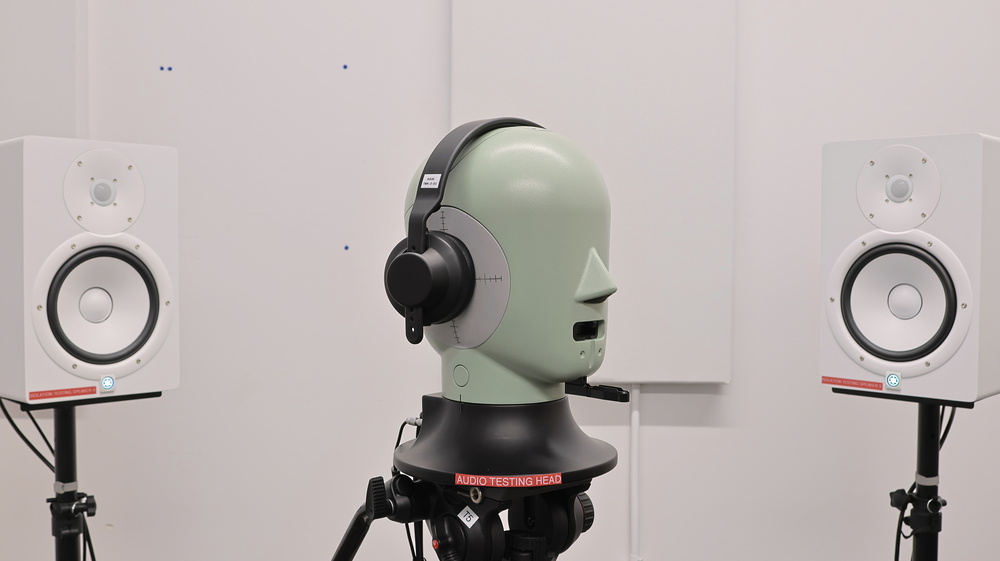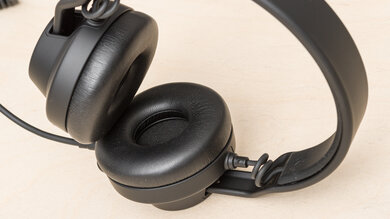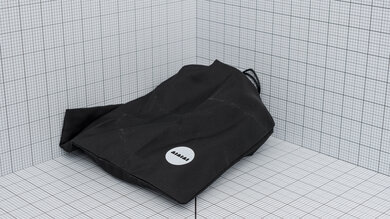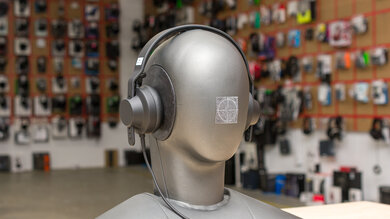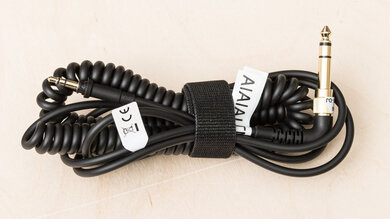AIAIAI has been around since 2010 and aims to do things a little differently than the big players by manufacturing modular headphones. The AIAIAI TMA-2 DJ is essentially an analog-only headphones kit that you assemble yourself, consisting of parts meant to work best for DJing. Most of the work has already been done by the factory, so what arrives simply requires sliding the drivers through the headband, plugging in the cables, and popping on the ear pads. You get the added bonus of possibly modifying them by swapping out components like the headband and drivers at additional costs. So, besides opening up the possibility of future upgrades, let's see how the headphones perform in this standard configuration.
Our Verdict
The AIAIAI TMA-2 DJ are sub-par for neutral sound. They sound very bass-heavy, with little treble content, so your audio won't sound very accurate. That can be useful for things like DJing, where bass content is important for beat matching but still results in muffled treble. They can vary in consistency between wears, especially if you have thick hair or glasses, and our unit has some harmonic distortion on the high frequencies. Still, their bass is fairly accurate, albeit exaggerated.
-
Modular design allows you to switch out components.
-
Uncomfortable headband.
-
Very veiled treble range.
The AIAIAI TMA-2 DJ are poor for travel and commutes. They don't reduce deep rumbles on buses and barely reduce chatter from reaching your ears. However, high-pitched sounds like babies crying on planes are blocked. They're analog-only headphones, so you'll have to contend with the chunky coiled cable, and the headphones don't fold down smaller. Their headband isn't very comfortable, although the ear pads feel decently cushioned.
-
Modular design allows you to switch out components.
-
Doesn't reduce low rumbling noise.
-
Uncomfortable headband.
-
Can't fold down to a smaller size.
The AIAIAI TMA-2 DJ are disappointing for sports and fitness. They're not intended for this use and will come off if you do anything more intense than walking with light nods. The headband catches on long or curly hair, which can happen during a fitness routine when they shift about. Their size is not portable, and they don't collapse into a smaller footprint. Plus, the coiled cable is hefty enough to get in your way while jogging. On the other hand, the headband is lined with silicone, which is easy to clean sweat from, and the bassy tuning can help motivate your workout.
-
Modular design allows you to switch out components.
-
Uncomfortable headband.
-
Can't fold down to a smaller size.
The AIAIAI TMA-2 DJ are poor for office use. They're not very comfortable to wear for the length of a workday due to the on-ear design, strong clamping force, and lack of substantial padding on the headband. The bass-heavy tuning isn't versatile enough for various media, like podcasts or music outside of EDM and hip-hop. If you take a lot of work calls, they don't include a mic, so you'll have to use an outboard mic or purchase a separate cable from the brand with a mic and remote. Their passive-only noise isolating performance won't cut out the hum of an HVAC unit or mid-range ambient din of an office, for instance. However, the passive isolation muffles chatter slightly and blocks high-pitched clinking cutlery from the employee kitchen.
-
Modular design allows you to switch out components.
-
Doesn't reduce low rumbling noise.
-
Uncomfortable headband.
-
No microphone included.
You can't use the AIAIAI TMA-2 DJ wirelessly for gaming because they're analog-only.
The AIAIAI TMA-2 DJ are inadequate for wired gaming. Their analog connectivity means you can plug them into your console's controller or PC for audio. The sound is bassy, so you'll feel the rumble of low-pitched effects, but character voices and brighter sounds are recessed in the mix. They lack a microphone to chat with friends, so you'll need a separate mic or buy one of the company's cables that includes an in-line mic, which isn't a dealbreaker, but it's an added cost. They're not especially comfortable, but they ought to stay put and don't weigh much overall.
-
Modular design allows you to switch out components.
-
Uncomfortable headband.
-
No microphone included.
The AIAIAI TMA-2 DJ don't have a microphone, so you can only use them for calls if you use a separate mic. The brand makes a cable with an in-line mic and remote, so you can purchase one separately for calls.
- 5.9 Neutral Sound
- 4.3 Commute/Travel
- 5.0 Sports/Fitness
- 4.7 Office
- 3.4 Wireless Gaming
- 5.4 Wired Gaming
- 1.6 Phone Calls
-
Updated Oct 30, 2024:
The following test groups have been updated after Test Bench 1.8: Sound Profile, Raw Frequency Response, Bass Profile: Target Compliance, Mid-Range Profile: Target Compliance, Treble Profile: Target Compliance, and Peaks/Dips. Associated text changes have been made to match results from Test Bench 1.7 to Noise Isolation - Full Range and Noise Isolation - Common Scenarios. Text changes have also been made throughout the review to match these results.
- Updated Oct 28, 2024: We've converted this review to Test Bench 1.8, which updates our target curve and Sound tests. You can read more about this in our changelog.
- Updated Jul 30, 2024: We've converted this review to Test Bench 1.7, which updates our Noise Isolation test. We've also expanded the scope of this test to include Common Scenarios in addition to Voice Handling and Wind Handling.
- Updated Jul 24, 2024: We've added a comparison between these headphones and the Fairphone Fairbuds XL Wireless in Build Quality.
- Updated Apr 24, 2024: We found an issue which affects the Passive Soundstage and Leakage scores in this review. The microphone used in this test produced a response lower than expected, which artificially boosted the scores. After investigating the issue, we have retested this affected product and updated our review.
- Updated Mar 22, 2024: Review published.
- Updated Mar 14, 2024: Early access published.
- Updated Mar 11, 2024: Our testers have started testing this product.
- Updated Feb 21, 2024: The product has arrived in our lab, and our testers will start evaluating it soon.
- Updated Feb 12, 2024: We've purchased the product and are waiting for it to arrive in our lab.
Differences Between Sizes And Variants
The AIAIAI TMA-2 DJ arrive as a preset combination of modular parts in a kit that you assemble from the box. There's just one color: black. For reference, the components for this set include 'S02' drivers, an 'H02' headband, 'E01' ear pads, and a 'C02' coiled cable. You can see the label for our unit here. Please let us know in the forums if you know of another variant.
Compared To Other Headphones
The first difference between the AIAIAI TMA-2 DJ and most headphones is their modular design. You can totally change the part most responsible for the sound profile, the drivers, which is very unusual. With that said, the AIAIAI TMA-2 DJ are bass-dominant. Another of the company's cans, the TMA-2 DJ XE, use interchangeable parts, too, with drivers meant to sound more analytical. When set against the Sennheiser HD 25, another pair of wired on-ears with a notable amount of boom, the AIAIAI have more bass on tap and much less high-end.
Look at our best DJ headphones picks for more gear choices. The best bass headphones are worth a gander if you count yourself as a bass head. Lastly, if you're early in your hunt for headphones but need help figuring out where to start, check out the best headphones.
The AIAIAI TMA-2 DJ and Sennheiser HD 25 headphones are designed for DJs or fans of bass-heavy music with on-ear designs and swappable cables. The AIAIAI sound more bass-heavy and roll off the high-mids and treble much more. Their design is modular, and you can swap out and replace nearly every component of the AIAIAI with other parts, but as is, they're less comfortable, and you can't pivot the ear cups at all. The Sennheiser cans still sound bassy but offer more treble, too. The unique splitting headband allows them to fit with better stability and comfort. The Sennheiser are the better pick for most DJs and bass fans for their overall utility. Still, if you're willing to spend more on other components, the AIAIAI can offer you more flexibility.
The Audio-Technica ATH-M50x and AIAIAI TMA-2 DJ are passive headphones aimed at audio professionals. The Audio-Technica headphones have a more neutral profile with some bass emphasis, but not a lot, making them versatile in studios and DJ booths. They fit over-ears, with ample padding, and can fold down smaller. The design is fairly bulky, and they feel a bit plasticky. The AIAIAI are on-ear headphones, but they're not more portable because they don't fold. They sound quite bassy, which you may prefer. You can change virtually every component, including the drivers, but as they are out of the box, their sound appeals more to EDM and hip-hop fans.
The V-MODA Crossfade 3 Wireless and AIAIAI TMA-2 DJ are both headphones tuned for bassheads. The V-MODA are over-ears with better build quality, and you can replace some parts, but they're more complex to fix. They work both wirelessly and with analog. Their passive sound is somewhat similar, but when connected to Bluetooth, they produce a brighter sound, even if they're still bass-heavy. You can EQ them with their app when used wirelessly, as well. They're more comfortable and stable, although their sound is negatively impacted by glasses and thick hair. On the other hand, the AIAIAI are rather simple analog-only on-ears. You assemble them yourself, and they're easy to repair. They feel less comfortable, largely due to the headband being lined only with silicone, but they weigh much less. These deliver a lot of boom to bass and their highs are dulled. Unlike the V-MODA, you can swap out virtually every component easily.
Test Results
The AIAIAI TMA-2 DJ have a unique modular design, similar to the Fairphone Fairbuds XL Wireless, which is a part of their appeal so that you can mix and match. However, these come as a preset kit with the following components:
- 'S02' drivers
- 'H02' headband
- 'E02' ear pads
- 'C02' cable
You can use other parts in the TMA-2 line, including the headband and drivers, which significantly change the wearing experience and sound profile. You have the option to customize your own modular headphones, or you can buy separate pieces for different uses.
Once assembled, they're sleek, uniformly black in a semi-matte finish, and have subtle branding on the headband. You slide the notched headband through the gap on each driver's housing and connect the cables, giving these a slightly Lego-like experience. It's a matter of preference, but the headband that sticks out the bottom doesn't necessarily make them look very premium. However, it's functional and reminiscent of older DJ headphones, as is the coiled cable. This specific combination only comes in a single color. It's not to be confused with the AIAIAI TMA-2 DJ XE preset kit that uses a different set of drivers, headband, and cable, although they look similar.
The AIAIAI TMA-2 DJ feel satisfactorily comfortable. The faux leather ear pads have a decent amount of give and cushion, but on-ear headphones don't tend to feel comfortable for long stretches. They exert enough clamping force that your ears can ache afterward. The nylon headband is flexible but lacks substantial padding and instead has a silicone inner lining where it meets the top of your head. This feels uncomfortable if you're bald because there's not much to cushion the headband on your skin, and the silicone also catches on long, curly hair. While the headphones are light, their coiled cable's heft is noticeable, and it tends to pull down the headphones on whichever side's ear cup you plug it into.
It's worth noting that part of the appeal of these headphones is the customization at an additional cost. For instance, some of the brand's other swappable headbands appear to have more plush cushions, such as the H03 and H04 which are labeled 'high comfort.' The company also makes straight cables, possibly weighing the headphones down less than the coiled cable.
These are middling for portability. They don't fold down into a smaller footprint, and the ear cups can't rotate to lay flat. As on-ear headphones without much padding, they aren't necessarily big but take up considerable space. You can only make them smaller if you fully disassemble them. Some bulkier over-ear headphones, like the Sennheiser HD 280 Pro 2016, can collapse to a similar size, so if you're considering on-ears because they seem relatively portable, these aren't that different.
The AIAIAI TMA-2 DJ come with a middling case. The drawstring pouch has a mesh lining. It doesn't protect from much besides dust or surface scratches, preventing the cable from getting tangled with your belongings in the same bag. Drops and liquid spills will still reach the headphones inside.
The AIAIAI TMA-2 DJ have decent build quality. You must assemble the parts yourself, but that's certainly easier than building Ikea furniture. The ear cups are well-made in semi-matte plastic with faux leather pads. Each ear cup has a port for the audio cable whether you're a righty or a lefty, or if the headphone output from a device is in an odd spot, this helps you reach it. Their TRS jacks are integrated into the headband to send the signal to the L/R drivers are fine, and so is the coiled cable.
The main issue is that the nylon headband is thin and lacks padding besides a layer of silicone that catches on curly and long hair. In addition, with heavy use, the notches in the headband that adjust sizing and connect to the ear cups can wear out over time. You can replace it, but all the headbands in this modular series use the same notch system. There's also the company's trade-in program, which lets you get a small credit return on your investment if you dislike a component.
These are decently stable. They stay on if you're walking around, tilting your head, or doing a subtle nod along to your music. If you start making more dramatic moves, they can come off. Plus, the weight from the cable pulls at whichever side it's connected to. If you move around a lot, your hair may get yanked by the headband, even if the headphones stay on.
The AIAIAI TMA-2 DJ are bass-heavy headphones. While the lower frequencies comply well with our target, the boosted bass response carries over into the mid-range, leading to a lot of rumble and punch and muddy mids. The high-mid through the treble regions are de-emphasized. Effectively, the bass and low mids overwhelm the de-emphasized higher frequencies where vocal details, bright instruments, and harmonic content in cymbals reside. This sounds like obscured vocal parts and muffled cymbals. You'll hear all kick drums and basslines with a lot of rumble and boominess.
This is extreme even for DJ headphones, which usually emphasize bass so you can match rhythms between songs. If you consider popular DJ cans like the Sennheiser HD 25, these also boost bass and low-mids but retain more treble, so you can hear those high-pitched parts, albeit not with perfect accuracy.
The AIAIAI TMA-2 DJ have alright frequency response consistency. Their mid-mids through low-treble is consistent. However, like most on-ears, the consistency of the mid-treble and higher performance varies between wears and different people. You'll also want to take care when placing them on your head because thick hair and glasses can break their seal and impact the bass delivery through the low-midrange. If you DJ, you might have to take your headphones on and off frequently, and these lack articulating arms or swiveling ear cups, which can otherwise mitigate needing to take your cans on and off repeatedly.
Their bass compliance is excellent In the low-bass region, sounds have a satisfying amount of rumble. The boominess increases towards the mid and high-bass, boosting the notes of basslines and thud of kicks to come across prominently in the mix.
Their mid-range compliance is disappointing. The low-mid region carries on as similarly boosted as the high-bass, leading busy mixes to sound boxy. The low-mid frequencies don't entirely mask the mid-mids, which are more in line with our mid-range target, but the sound is uneven and cluttered. The high-mids range progressively tapers off in amplitude, resulting in veiled lead instruments at higher registers like keys and guitar.
The AIAIAI TMA-2 DJ have awful treble compliance, as the entire range falls well short of our target. Vocals lack detail and clarity and get pushed low in the mix, and the harmonics of cymbals come across as unnaturally quiet, dull, and lacking airiness. The exaggerated bass and low mids combine with the strongly de-emphasized treble to create an overly warm treble. Typically, this can alleviate ear fatigue during long sessions, but for many, it's an overcorrection.
The AIAIAI TMA-2 DJ's peaks and dips performance is very good. Their bass and mid-range are consistent, meaning these headphones follow their own sound profile well. However, this isn't the case with the treble range, which features uneven dips and peaks. A slight dip in the high-mid and into part of the low-treble weakens vocals somewhat, sounding dark and lacking detail. A series of sharper peaks and dips that occur across the low and mid-treble add slightly more clarity to sibilants of a certain pitch, though this range is still veiled overall.
The imaging is good. Our unit is the first product by this manufacturer that we've tested. That said, our unit's drivers are well-matched in phase, and their group delay is below the audibility threshold when listening to real-life media content, meaning your audio is transparent and the bass sounds tight. This can indicate good ergonomics and quality control.
During a frequency sweep, a faint pop in the bass is audible, but with music, you won't hear that. One of the drivers of our unit doesn't match the amplitude of the other driver, and with regular media, it isn't necessarily noticeable. It can get annoying when you notice it. It sounds like a very minor shift of the soundstage. Imaging varies between units, so these findings are only valid for our unit.
These have a poor soundstage, but that's expected of closed-back headphones. They don't sound spacious, immersive, or open. Instead of music sounding like it's playing spread out and in the room as with open-backs, these sound focused. This results in your music sounding like it's coming from inside your head.
These have reasonable harmonic distortion performance. Through most of the bass and mids, their signal sounds clean. The low-bass distortion peak isn't too bad, but the high-mid into the treble range adds unwanted distortion to the signal. Since those higher regions are already quite recessed in the headphones' tuning, compared to the lower frequencies, this distortion additionally obscures the details of vocals.
These are the settings used to test these headphones. Our results are only valid when used in this configuration.
The AIAIAI TMA-2 DJ have a poor full-range noise isolation performance, as to be expected from on-ear headphones without active noise cancelling. They only use their closed-back housings, ear pads, and clamping force to seal your ears. As a result, the passive isolation doesn't reduce how much low, rumbly environmental noise reaches your ears, so if you're on the bus, the rumbling engine comes through, and similarly, in a club, the bassy parts of music playing in the room gets through too (this can account for exaggerating the bass in the sound profile to combat the room). The higher frequency din of ambient sounds like chatter gets reduced, but not significantly. Meanwhile, a solid amount of bright, trebly noise like glass clinking is also blocked. They isolate out highs superbly, but not low-frequency noise.
These headphones perform poorly when it comes to isolating you against common scenarios. They struggle to block out the bass-range roar of an airplane's engine or more mid-range-focused sounds, like passing cars zipping by. They fare slightly better in office environments where their passively isolating fit offers some attenuation against chattering co-workers.
These have good leakage performance. The sound leaked is perfectly acceptably quiet in most spaces, such as homes and offices. What does escape is an uneven and dull version of what you're listening to, with not much low-end. If vocals are mixed high in the audio, they'll remain fairly understandable in very quiet spaces. Still, how much leaks depends greatly on your listening volume.
These don't come with a microphone, but you can buy a separate cable from the manufacturer with an in-line mic and remote. The part is called 'C01 - Cable'.
The AIAIAI TMA-2 DJ have outstanding wired connectivity. Depending on your preference, they come with a single 1/8" coiled TRS cable that plugs into either driver. It twists to lock it into place. The 1/8" jack is slightly bent to keep it out of the way while still being able to fit into tight spaces. You also get a 1/4" adapter that screws on if you need it. The company sells replacement cables if you need one as well.
You can plug the headphones into your PC to listen to audio. They don't have a mic, so you'd need to buy a replacement cable from the manufacturer with in-line controls and a mic.
You can connect the headphones to your PlayStation controller for audio support. They lack a microphone, so if you want to talk with friends during a game, you'll need to buy a separate cable from the manufacturer with a mic and in-line controls.
The AIAIAI TMA-2 DJ can connect to your Xbox controller for audio support. However, they're audio-only, so you'll need to buy a cable from the manufacturer with in-line controls and a mic if you want to chat with your team.

